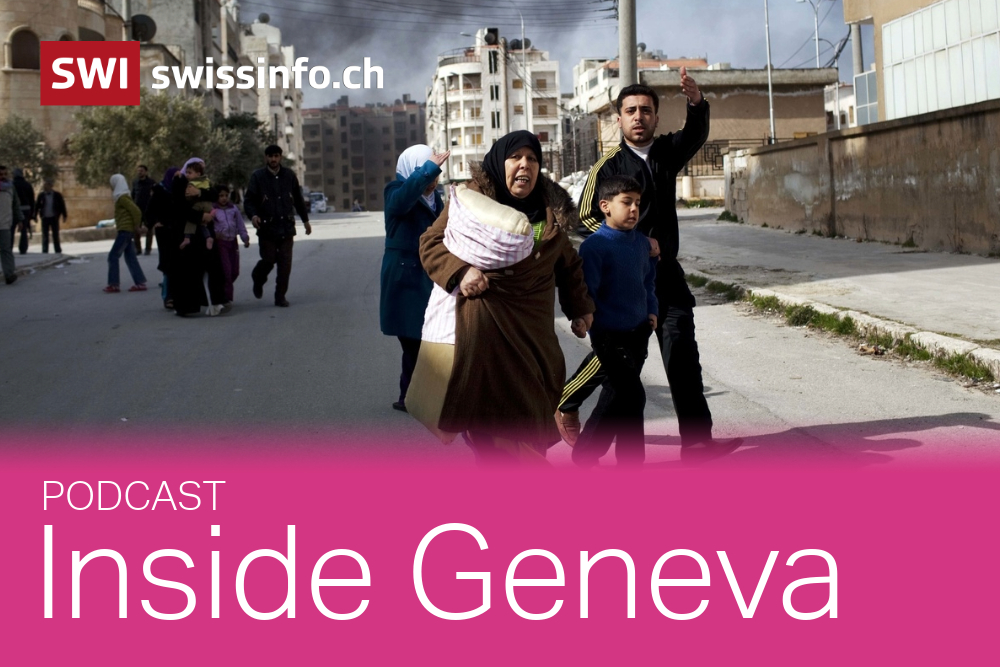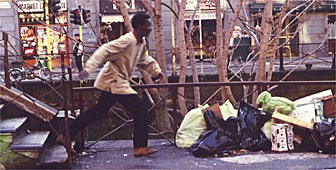
Images from a forgotten war

A new film and photography exhibition in Zurich is aiming to shed light on Algeria's "forgotten" civil war.
Swiss photographer Michael von Graffenried also hopes the display can help to promote dialogue between different faiths in the aftermath of September 11.
“When George Bush called for a war against terrorism last year, it made me think about how the Algerian military have been fighting “terrorists” for more than ten years,” von Graffenried told swissinfo.
“I don’t know how America is getting on in its war, but in Algeria they have managed to kill 200,000 people and cause another 15,000 to disappear without moving a single step forward.”
Von Graffenried has been chronicling Algerian life since 1991 – the year in which the military took control of the state in response to the electoral success of the Islamist FIS party.
Acts of aggression
In the years since the coup, the Swiss photographer has returned frequently to North Africa, covertly recording acts of aggression and intimidation but also observing Algerian daily life and culture.
Because of military restrictions on one side and religious objections to photography on the other, von Graffenried is usually forced to film most of his subjects without their consent, using a panoramic camera which he secures discreetly about his waist.
But while Von Graffenried’s stark black-and-white images form the backbone of the exhibition, it is his recent collaboration with Algerian filmmaker Mohammed Soudani that really brings the photographs to life.
Swiss connection
Soudani has been based in southern Switzerland for more than 30 years, having left his homeland as a young professional footballer in 1971.
Formally trained as a cameraman, Soudani was soon to give up his sport to concentrate on film production in canton Ticino – but his first encounter with von Graffenried had nothing to do with their Swiss connection.
“We both happened to be at a workshop in Ivory Coast in 1999,” von Graffenried recalls, “and Mohammed came up to me and told me that he was also from Switzerland.
“‘But you can’t be – you’re black,’ I replied, and then he explained that he originally came from Algeria, which of course made it an even bigger coincidence.”
Having discovered the common bond, von Graffenried presented Soudani with a collection of his photographs – unwittingly sowing the seed for their subsequent collaboration.
“When I looked at Michael’s pictures in my hotel room that night, they spoke directly to me,” an animated Soudani remembers. “They made me wonder why I had left Algeria in the first place, but also told me about what had happened since then, about the crime levels in the country and about the power of the military.
“I knew I had to do something with this photography.”
Chilling testimony
Returning to Algeria without an official permit to film, Soudani and von Graffenried were able to track down and interview many of the subjects from von Graffenried’s original photos. The resulting conversations pay chilling testimony to the sufferings and indignities of a nation at war with itself.
Next to one picture of a shocked bomb attack victim, visitors to the Zurich exhibition can now see a short video clip in which the woman herself updates the story.
“When I was lying in the hospital, I was visited by the mother of the man who was meant to be my future husband,” the woman, identified as Fatiha, recalls. “She took one look at my scarred face and left the room – I never heard from my fiancé again after that.”
In another interview, the renowned Algerian music journalist Aziz Smati tells of his disbelief after surviving an assassination attempt only to have a nurse steal the watch off his wrist as he lay in hospital, seemingly close to death.
Wider audience
Having finally spoken to the subjects of his black-and-white pictures, von Graffenried hopes their stories and opinions will now find a wider audience – even if some of the Algerians’ beliefs make for difficult listening.
“I met one fundamentalist who had a copy of my book in which he had covered up some of the photographs, including a beach scene,” von Graffenried told swissinfo. “This man insisted that the wearing of bikinis was “terrorism” – he had picked up the English word from all the September 11 coverage.
“So I asked him what he thought of my actions in taking his photograph without his consent and against his religion. ‘I have no problem with anything you do,” he replied. ‘You are a Christian man… you are already going to Hell.’
“That can be hard stuff for westerners to swallow,” von Graffenried concedes. “And I have no doubt that there are many thousands of people who think in the same way as that man. But I still think it is essential that we in the west hear these opinions. How else can we begin a proper dialogue?”
The exhibition, entitled “In the heart of Algeria”, can be seen at the Museum of Design in Zurich until October 27. The museum is showing Mohammed Soudani’s documentary film “guerre sans images” (War without images) on August 31 as part of Zurich’s “Long night of the museums”.
by Mark Ledsom, Zurich
Algeria gained independence from France in 1962 after a bloody struggle with the former colonial power.
Wide scale violence returned to the country in 1991, following a coup by the Algerian military.
An estimated 100,000 people have died in the current power struggle.
The Zurich exhibition combines the work of award-winning Swiss photographer Michael von Graffenried with that of Swiss-based Algerian filmmaker Mohammed Soudani.
Born in Bern in 1957, von Graffenried has been visiting Algeria since 1991. His work has also included major exhibitions focussing on Switzerland (“Swiss Image”, “Swiss People” and “Swiss Panorama”).
The exhibition at Zurich’s Museum of Design runs until October 27.

In compliance with the JTI standards
More: SWI swissinfo.ch certified by the Journalism Trust Initiative




































You can find an overview of ongoing debates with our journalists here . Please join us!
If you want to start a conversation about a topic raised in this article or want to report factual errors, email us at english@swissinfo.ch.